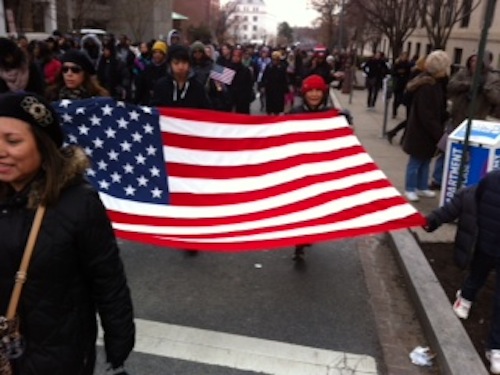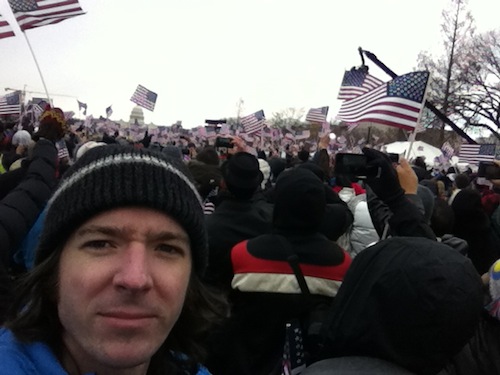The National Mall, Washington, D.C.
Who: Richard Blanco
What: President Obama's Second Inauguration
When: January 21st, 2013
Where: The National Mall, Washington, D.C.
***

“Knock knock.” “Who's there?” “Inaugural poem!”
That's the approach I settled on as I biked down to the National Mall this morning. A good way in, I thought, much more likely to get honest responses than the more straightforward "journalistic" approach, and also: funny. But then I realized at about U Street that "inaugural poem" sounds a lot like "doggerel poem," which could actually make people irrationally excited, or, at least, more confused than I wanted them to be. Assuming Richard Blanco's inaugural poem would be many things but not actual doggerel. So maybe "Knock knock” “Who's there?” “POETRY!"?? And then maybe people would either shrink from me in disgust or become quite thoughtful, put a hand to the collective chins, and say, "Tell me more!" Or they might actually recite their own poetry, which sometimes happens, often more of a freestyle rap or, come to think of it, a bit of doggerel, which wouldn't really do much for my purposes of finding out what people's expectations for and/or responses to this inaugural poem actually are, but it could leave me shaking my head and humming, "Ain't that America."
(Hums)
Okay, so by the time I actually stashed my bike, ate a Cliff Bar, fought my way to the giant Orwellian TV screens on the Mall and saw the people huddled together giddily, waving flags, some crying tears of seemingly real joy, I realized there was no need to be a half-clever jerk about this whole thing. Don’t go default mode. Just introduce self and ask people straight up what they think about Richard Blanco, inaugural poetry, life, etc.
(Also, full disclosure: I tried the knock knock joke out on a security guy (Response? Big frown)). So, in the crowd at the Mall, surrounded by people cheering and chanting “Obama! Obama!” I asked a lady beside me about the inaugural poem.
“The what?” she said.
“Inaugural poem!” I said.
“Oh, Maya Angelou?” she said.
“Uh, no, not this time,” I said. “Richard Blanco.”
I had brought his latest book, which I showed the lady, who turned out to be from Birmingham and had driven up with her husband over the weekend.
“Okay!” she said, “He’s the new guy?”
“Yep, new guy,” I said. “He reads right after Kelly Clarkson, I think.”
“Alright then,” she said with a smile, sort of backing away from me. “I’ll listen. Thank you.”
Civic deed done, I made my way past some French teenagers smoking hand-rolled cigarettes, talking about “la terre,” and a couple of middle school kids in ski masks pretending to stab each other with little wooden flags.
I positioned myself next to a very stoic looking woman with a “Hilary 2016” button on, just as Ms. Clarkson was demonstrating what seemed to be an aural firehose but was in fact “My country 'tis of thee.” People were cheering wildly, waving flags, and yelling, breath clouds puffing up near the CNN camera. People loved that Kelly Clarkson! Charles Schumer, master of ceremonies, even came to the lectern, and said, “Wow!” right after.
And then, he introduced Mr. Blanco.
Tough gig. Just like four years ago, after the president’s speech and after a song, the crowd had begun to shift, its attention broken. The woman next to me asked her partner, “Who’s this guy?” as the poet filled the Jumbotron. Partner shrugged and made a “whatev” face. Blanco began and our aurally firehosed ears took a second to adjust. The sound system muddied the words, but the cadence was clear, and some echoed back to us almost as if they were spoken right next to us. The stoic Hilary woman nodded along. At the mention of “Mississippi” a man next to me waved his flag and whooped. Another pocket of whoops erupted at “buenos días,” but collectively around me shoulders began to slump as the poem progressed. A pod of undergrads, seemingly inoculated to poetry’s charms by classroom exposure, sighed and rolled their eyes. A young man draped in a rainbow flag stuck out his jaw and made a “get on with it” hand gesture to his friends who snapped his photo.
On the Jumbotron, Obama nodded.
Making my way through the crowd to a man who looked to be listening intently (a poetry fan?), a girl stopped me and asked if I knew when Beyoncé was going on.
“The end,” I said. “Beyoncé closes the show.”
“Right,” she said and I moved past her, but the poetry fan had disappeared. The poem ended. A mass exodus pushed all of us toward the security gates again, and the crowd become focused on logistics, not poetry.
“12th st!” “No 7th!” “Can you get out at 3rd?” “Did you like the poem?” “The what?”
Four years ago, in Seattle, I walked out of my apartment after watching the inauguration on TV and asked a woman at the bus stop what she thought of Elizabeth Alexander’s poem.
“Ugh,” she said. “Too long.”
I was sad. Naïve, I felt that the world became slightly diminished on that day. I wanted a poem to do for a screaming crowd what it did for my quiet brain, but that was not the world we lived in then. Now, this world, four years later, is most likely no more so. I sighed my poet’s sigh as an army officer told me if I touched that barricade again I would “not be a happy dude.” Up, further away, with the crowd, I saw a family carrying a bright American flag. They chatted with each other happily in Spanish, grandma, mom, kids, maybe aunts, an uncle. I jogged up to them and asked the lady holding the upper right corner of the flag what she thought of the poem.
“The poem?” she said, eyebrows arched?
Oh well. “Yeah, the poem,” I said, “right after Kelly Clarkson.
“Oh,” she said, and motioned for the family to stop, “It gave me chills.”
“The poem?”
“That poem, I mean, the words may not be clear to everyone, but it means so much to me,” she said. “It was inclusive, and it just . . .”
She faltered, and put her hand on my arm. I stopped and smiled a I-have-all-day-to-talk smile.
“I’m so glad you asked,” she said finally, “but I don’t know if I can tell you why it was important, because it’s poetry you know? But it was. It was important to me, and it was important to my family. I’m so glad there was room for poetry there.”
She patted me on my arm and laughed, then gave her family the sign to keep marching, which they did.
***

Travis Nichols is a media officer at Greenpeace USA. He is the author of the poetry collections Iowa and See Me Improving, as well as the novels Off We Go Into the Wild Blue Yonder and The More You Ignore Me (forthcoming).
(If you would like to pitch an “Open Door” feature concept, please email [email protected] with “Open Door” in the subject line.)
Travis Nichols is the author of two books of poetry: Iowa (2010, Letter Machine Editions) and See Me...
Read Full Biography

